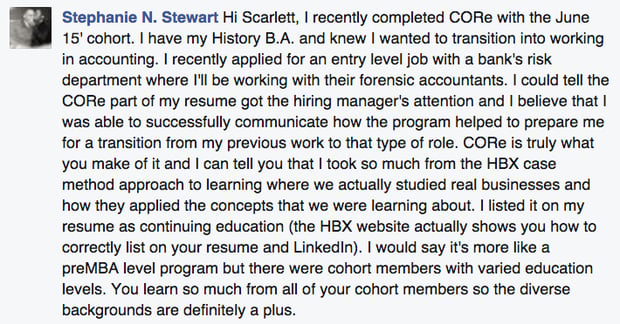
Here are answers to some of the top questions we got from prospective HBX CORe students during our Facebook Q&A session last month, including the difference between the non-credit and for-credit versions of CORe, the application process, and financing options.
1. I have no background in business. Will I be able to keep up? Will CORe help me get a job?
We don't expect you to know anything about business going in, but you should have a deep curiosity or interest in it. The course work starts out with the basics and works up to more complex concepts. The diversity and richness of the CORe community is one of the aspects that truly sets it apart from other online courses; here's what a few of our past students shared about their own backgrounds and experience in the program:


2. I have a degree in business. Is CORe appropriate for me? What will I get out of it?
If you're on the fence, we recommend reviewing the syllabi on the HBX website to see what is covered. Many CORe students who hold undergraduate business degrees have reported finding the program to be quite useful as it serves as a great refresher and focuses on real-world applications of business using a case-based pedagogy, which sets it apart from most undergraduate programs.
Here's what some of our past students said:



3. Will CORe help me prepare for an MBA program or enhance my chances of being accepted?
The CORe curriculum was developed by Harvard Business School faculty as a way to prepare incoming students for the MBA program, and we've had a number of CORe students go on to enroll in an MBA program after earning the credential. A great example is Lauren Hall: http://www.abouthbx.com/student-profiles/lauren.
That said, MBA program applicants (at HBS or elsewhere) will have an opportunity to inform the Admissions Board of non-degree preparatory coursework like HBX CORe. This is one of many application elements and will be considered in the larger context of a holistic selection process.
4. What is the difference between the non-credit and for-credit options?
For some cohorts, we offer an undergraduate credit option through Harvard Extension School. The next for-credit cohort will be offered in May 2016. When you start your application, you can select whether you are seeking admission for the for-credit or non-credit option of CORe. The course content, deadlines, and grading process are all the same whether you choose to enroll in the undergraduate credit ($3,600) or credential-only ($1,800) version of CORe.
Upon successful completion of the program, all students will receive a Credential of Readiness certificate from Harvard Business School and HBX, and an official transcript will be made available to verify your mastery of the skills. If you enroll in the undergraduate credit option, you will also earn eight undergraduate credits from Harvard Extension School or Harvard Summer School.
Different financing options and needs-based scholarships are available depending on the way you choose to enroll. More information is available at http://hbx.hbs.edu/hbx-core/financing-options.html.
5. How is CORe different from other online courses, and how do you encourage a high level of interaction between students and professors?
All of the course content was developed uniquely for HBX and does not correspond to courses taught at HBS. The professors continue to be involved in refining and improving the courses but do not regularly interact with students on a day-to-day basis. However, HBX does feature a robust peer-learning model (all students are expected to participate) with a support desk to answer questions that cannot be adequately addressed in the Peer Help system.



6. What do you look for in the application process?
We look for two things in the application process: aptitude and motivation. For aptitude we ask for your academic background and for you to answer five mathematical skill check questions (in order to get some insight into your ability to be successful in the program).
We also included two short essays - one required and one optional - to give us a window into your motivation to contribute to the CORe learning community and complete the program. The application is free and should take about 20 minutes to complete.
7. Is CORe really worth it? What financial aid or financing options are available?
We don't want to speak for our students, but many of them have expressed their satisfaction with the course on our blog, in various student profiles, and in our CORe Credential Holders album on Facebook.
US citizens who are currently enrolled in an undergraduate or graduate degree program may qualify for institutional need-based scholarships. The online HBX CORe application features an "Institutional Need-Based Scholarship" section that will assist in determining your eligibility.
HBX also offers scholarships to students who attend one of our U.S. collaborating colleges. These colleges have entered into agreements with HBX to help expand access to scholarships for their students.
Additional financing options are available through third party lenders: http://hbx.hbs.edu/hbx-core/financing-options.html
These questions were raised during our Facebook Q&A session on December 11, 2015. To read through the full conversation and get additional insights from past students, visit the event page!
Ready to apply for the next cohort?








